Photo filters have become a cornerstone of social media life. Whether you choose to post with a flower crown, dog ears or a funky alien face, these digital enhancements can take your selfie game to the next level. While some people view the filters jokingly, others are falling into a new phenomenon called "Snapchat dysmorphia."
PHOTO: YourFaceInOurHands
A new piece titled "Selfies — Living in the Era of Filtered Photographs" published by the Journal of the American Medical Association explored the effects edited photos and filters are having on young people, as well as people living with body dysmorphia or those seeking facial cosmetic surgery. The article cited recent data from an American Academy of Facial Plastic and Reconstructive Surgery (AAFPRS) survey that found 55 percent of surgeons in facial plastic surgery have met with patients who are requesting surgeries to enhance their appearance in selfies; that number has risen 13 percent since 2016.
"For a few years, AAFPRS members have been at the forefront of this trend," said AAFPRS President William H. Truswell, M.D. "More and more of our patients are using social media as a forum to gain a sense of solidarity when under-going a major, potentially life-changing procedure. Consumers are only a swipe away from finding love and a new look, and this movement is only going to get stronger."
Previously, patients would go into their consultations with photos of celebrities and attempt to duplicate their features. However, now with the access to filters on social media sites, photo enhancing apps and easy-to-use software that can all alter photographs, anyone can transform their own photos into a version of themselves they desire.
"This is an alarming trend because those filtered selfies often present an unattainable look and are blurring the line of reality and fantasy for these patients," the researchers assert in their piece.
PHOTO: VideoBlock
"It can be argued that these apps are making us lose touch with reality because we expect to look perfectly primped and filtered in real life as well," the researchers note. "Filtered selfies especially can have harmful effects on adolescents or those with BDD because these groups may more severely internalize this beauty standard. It is important for clinicians to understand the implications of social media on body image and self-esteem to better treat and counsel their patients."
Ready. Set. Boss. Our daily email is pouring out inspiration with the latest #BlackGirlBossUp moments, tips on hair, beauty and lifestyle to get you on track to a better you! Sign up today.
